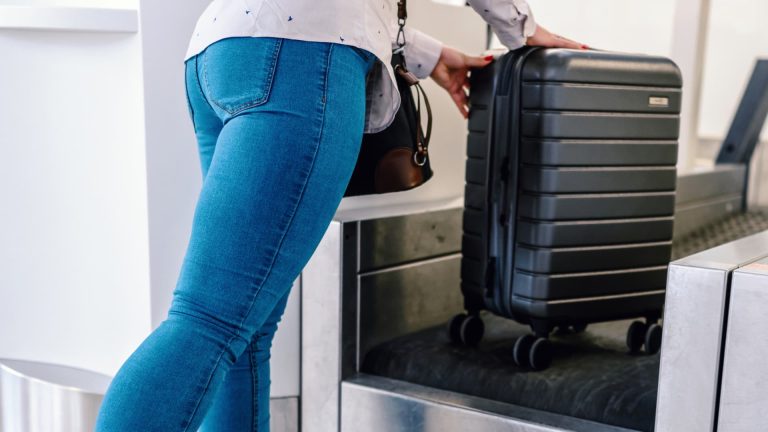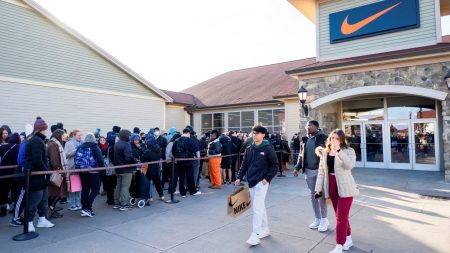Starting Monday, passengers flying on Korean Air may be asked to step on a scale before boarding their flight.
The exercise, which will last about three weeks, is required by law and applies to all Korean flag carriers, a Korean Air representative told CNBC.
The law requires airlines to weigh passengers and their carry-on luggage at least every five years and is “crucial for safety of flight operations,” the representative told CNBC.
The announcement was met with backlash from the public, according to local media.
A notice detailing the exercise — set to begin at Gimpo International Airport Monday, followed by Incheon Airport next month — has been removed from the airline’s website, due to “sufficient notice and media coverage,” according to the airline.
Is it reasonable to weigh passengers?
“Definitely not,” said Vance Hilderman, CEO of the aviation safety company Afuzion.
At least not for the purpose of safety, he said.
“If you’re at a small Bombardier, a small Embraer jet, and we had 10 very obese people … it could make a small difference,” he said. “On commercial aircraft, anything from a 737 and above you know, 120 people, we have it built in.”
Aviation software can adjust for weight changes, air density and other factors, which is why safety isn’t compromised even in situations where passenger makeup is atypical, such as an early morning flight of mostly businessmen, who tend to weigh more than the average traveler, he said.
Overall, a significant weight increase per passenger would be eclipsed by the weight of fuel, cargo and the aircraft itself, said Hilderman. “Fuel is 20 times more than the passenger weight,” he said.
But Shem Malmquist, an instructor at Florida Tech’s College of Aeronautics, said random weight samples are a good idea.
“We use average weights of passengers, but people are getting a lot heavier,” he said. “Three hundred people that weigh more than average can put an airplane significantly over weight, and all of our performance calculations — runway length, climb, obstacle clearance, landing distances, altitude capabilities — all are dependent on weight, among other things.”
Hilderman agrees that people are getting bigger, but he said passengers now differ in other ways too.
“Americans are getting heavier. So are Chinese, so are Koreans,” he said. “But we’re also flying younger … so it’s actually offset the average human’s weight increase.”
A study published in 2019 in the Journal of Transport & Health found that regions with higher obesity prevalence “may begin to see significantly compromised safety margins if increasing weight trends continue.”
Jose Silva, an associate professor at Australia’s RMIT University’s School of Engineering and one of the study’s authors, told CNBC that he thinks airlines are reluctant to weigh passengers due to the sensitive nature of the topic.
“There is also a lack of understanding of the safety gains which could be obtained if there were more accurate means to ascertain the passengers’ weight, instead of relying on standards,” he said.
A whistleblower complaint filed in 2021 alleges that the U.S. Federal Aviation Administration has failed to recognize safety issues caused by relying on average passenger or baggage weights that no longer reflect the U.S. population.
Where airlines weigh passengers
Air New Zealand weighed passengers in June for reasons, it said, related to safety and fuel efficiency.
Finnair did the same in 2017, and Hawaiian Air has conducted multiple passenger weight exercises on flights between Honolulu and American Samoa. (The now defunct Samoa Air used to charge passengers by their weight, according to Reuters.)
Flyers in the United States likely won’t be weighed, said Hilderman, even though an FAA advisory circular published in 2019 stated that airlines can weigh passengers.
It’s a different story in Europe, where carriers follow European Union Aviation Safety Agency (EASA) regulations.
EASA weighed nearly 23,000 passengers in 2008 and 2009 and found that average passenger weight had increased by 3 to 5 kilograms (6.6 to 11 pounds). A subsequent report published in 2022 found that mean passenger weight increased slightly since 2009, for an average of 82 kg (181 pounds) for men and 68 kg (149 pounds) for women.
Periodic weight assessments — of passengers and other items on board — can help airlines determine if weight estimates are still accurate to offset the amount of cargo they carry, said Hilderman.
But “there’s a little more to this mystery,” he added.
“In Europe, they’re a little more rigorous about individual rights with privacy,” he said. “With EASA, they want to protect the passengers and say: Look, the passengers are getting larger, so airlines, we want you to provide a minimum pitch distance on your seats.”
Commercial airline seating is based on average passenger weight from the 1950s to 1970s, Hilderman said. Since then, people have gotten bigger, but airline seats have dwindled, he said — “29 inches in some cases, it’s absolutely ridiculous.”
A hot-button topic
Passenger size on planes is a controversial topic — with oversized flyers lodging discrimination allegations over Lilliputian plane aisles and seat sizes, and smaller travelers publicly venting about seat encroachment.
But unlike other industries that service heavy people — from makers of chairs to toilets to amusement park rides — the airline industry hasn’t enlarged seats.
“Some have proposed that obese passengers be required to pay for two seats in order to not make other passengers uncomfortable, but that lets the airlines escape any responsibility,” said Nick Gausling, a consumer services business consultant and managing director of Romy Group LLC.
Gausling noted that while other industries have been pressured to prioritize customer experience, “consumers have very little choice to take their business elsewhere” when it comes to airlines.
Tigress Osborn, the executive director of the National Association to Advance Fat Acceptance, told CNBC that most major airlines have responded with three options for overweight travelers: pay for pricier tickets that come with bigger seats, purchase a second seat, or stay home.
“Fat people deserve to travel for pleasure just like everyone else, and we also need to remember that air travel is for work, for family obligations, and for other responsibilities, too,” she said. “Our taxes help support this industry, and we deserve to be accommodated safely and comfortably, with access to accessible seating at all price levels.”
Ideas to help larger passengers
Hilderman said airlines can sell second seats to plus-size travelers at a heavily discounted rate.
Or they can reserve half a dozen seats for larger people, which passengers could privately register for online, using height and weight details from their driver’s licenses, he said.
Those seats could be sold at a small surcharge, and if not booked by qualified passengers the week before the flight, released to anyone willing to pay for them, he added.
Any hope for wider seats?
As to whether airlines will increase seat sizes for everyone, Hilderman said that while it’s mathematically possible, it’s not practical.
“Fuselage diameters have been predetermined,” he said, referencing the main body of the aircraft. “We currently have 29,000 commercial aircraft flying, and we only make about 1,500 per year, so it would take 20 years to replace the entire fleet.”
Refitting planes with wider seats means narrowing the aisle, which is already a tight squeeze, he said. To widen the aisle, one seat from every row would need to be removed, resulting in a 20-25% ticket price increase across the board, he said.
“Most people don’t look at what kind of aircraft they’re flying, and they have no idea what the seat pitch or width is,” said Hilderman. “They’re simply buying on price — and the airlines know that.”
Arnold Barnett, a management science and statistics professor at the MIT Sloan School of Management, told CNBC that most flyers are willing to endure current seat sizes in return for lower fares.
If seating changed, “airfares would have to go up, and flying would become unaffordable to passengers on limited budgets.”
For many, a tight airline seat is better than a seat on a bus, he said.
Read the full article here









